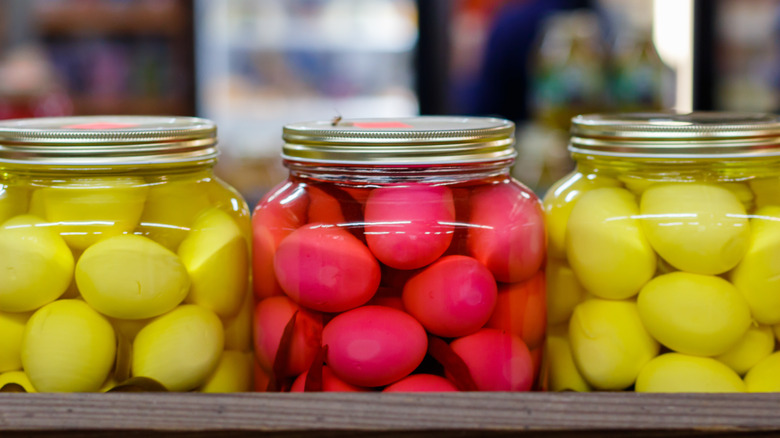How Long Should Pickled Eggs Usually Last?
Pickling is an ancient preservation method that infuses food with so much flavor. Take pickled eggs, for instance, which is a protein-rich snack that lots of people can't get enough of. Although they're relatively easy to prepare at home, pickled eggs can also be conveniently purchased from just about any grocery store. While recipes can vary from brand to brand, store-bought pickled eggs are often submerged in pickling solutions consisting of ingredients like beet juice, vinegar, water, and sugar. Commercial pickled eggs can also contain sodium benzoate, which is a common preservative that keeps food stable on store shelves.
In general, all pickled eggs can last up to four months in the refrigerator before experiencing decreased quality. Keep in mind that eggs may be safe to eat after that time, but they're not likely to be as tasty as when you first bought them. Also, store-bought eggs typically come with a best-by or use-by date determined by the manufacturer. It's always a good idea to follow that and other guidelines on the label to ensure a safe and enjoyable experience.
What about homemade pickled eggs?
If you're inspired to experiment with a pickled eggs recipe at home, there are some essential guidelines to consider before getting started. Like commercial brands, homemade pickled eggs usually have a maximum four-month lifespan when refrigerated appropriately. However, using the right pickling technique is essential to ensure your eggs will keep well for as long as possible.
Hard-boiled eggs are pickled using a vinegar solution, which is boiled to prevent the presence of harmful bacteria. Eggs are deposited into sterile jars, to which the vinegar solution is added. The eggs in the jar must be fully immersed in the vinegar solution, or you run the risk of bacterial growth. That means you must be mindful of how many eggs you add to the jars. If you're using a quart-sized jar, it should be able to accommodate 12 small to medium-sized eggs. After pouring in the solution, the sealed jars containing your eggs must be transferred to the refrigerator without delay. In fact, refrigeration is a key factor in the lifespan of pickled eggs.
Why storing pickled eggs in the refrigerator is so crucial
Whether you buy pickled eggs at your local grocery store or make them yourself, refrigerator storage is a must. Leaving eggs exposed to room temperatures can greatly increase the risk of foodborne illness, especially if two or more hours elapse. Accordingly, the only time pickled eggs should be removed from the cold confines of the fridge is when you're eating them or using them in recipes.
While proper storage is important for all types of pickled eggs, it's particularly crucial when it comes to homemade varieties. Consider that leaving pickled eggs in room temperature conditions resulted in a case of foodborne botulism, as reported by the CDC. After eating the homemade eggs, a person developed significant nausea and stomach pain. The incident even led to hospitalization, at which point the link between the homemade pickled eggs and the illness was discovered. While the person was able to make a full recovery, this experience highlights the importance of storing pickled eggs properly. With these helpful tips, you can avoid major pickled egg mistakes to ensure a safe and delicious snack.


